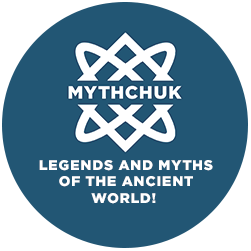Odin – Supreme Norse God of Wisdom, War, and Sacrifice
- Main
- >
- Norse Mythology
- >
- Norse Pantheon of Gods
- >
- Odin
Odin sacrificed an eye to gain wisdom… But that’s not even his greatest sacrifice. Stay tuned until the end.
Who is Odin?
Odin is the supreme god in the Norse pantheon, ruler of Asgard, and the god of war, wisdom, death, poetry, and magic. Son of Borr and the giantess Bestla, he is father to many gods, including Thor and Baldr. His greatest renown lies in his relentless pursuit of knowledge—no matter the cost of suffering or death. Ancient sources, the Poetic Edda and Prose Edda, portray Odin as the deepest and most mysterious of all gods.
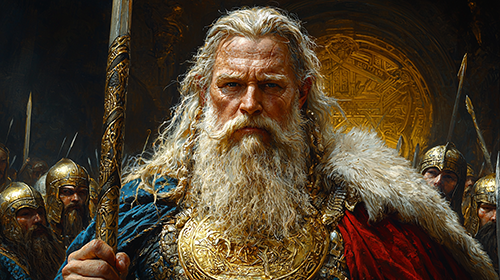 Odin
OdinOrigins and Rise to Power
In the earliest myths, according to the “Völuspá,” Borr was born to the primordial beings Ymir and Búri. Borr married the giantess Bestla, and from their union came three sons: Odin, Vili, and Vé. These three slayed Ymir—the ancestor of giants—and fashioned the world from his body: the flesh became earth, the blood the seas, the bones the mountains, and his skull the sky.
Odin, as the eldest, took leadership of Asgard. From the very beginning, his defining traits were a thirst for knowledge and a desire to shape destiny.
 Origins and Rise to Power
Origins and Rise to PowerThe Wisdom Bargain—Mímir’s Well
Odin’s most famous tale tells of his visit to Mímir’s Well, located beneath the World Tree, Yggdrasil. Mímir, its guardian, agreed to share his deep wisdom—but demanded a terrible price.
Odin sacrificed his eye, casting it into the well, so he could drink and see deeper truths. From that day forward, he became a one-eyed elder who perceives far more than anyone else. This act of self-sacrifice epitomizes Odin’s defining characteristic: willing to give anything for higher understanding.
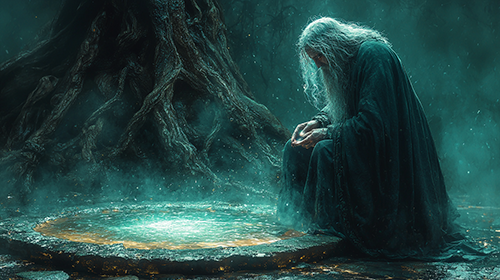 Mímir’s Well
Mímir’s WellNine Nights on the Tree—Birth of the Runes
Another key legend is Odin’s self-sacrifice on Yggdrasil. In the poem Hávamál, he recounts how he hung from the tree for nine days and nights, pierced by his own spear, without food or drink. He offered himself to himself to gain the runes—cosmic, spiritual symbols of power.
On the ninth day, he fell, but now in possession of the runes. From that moment, he wielded the magic of words, spells, and enchantments. This myth highlights the profound Norse belief that true wisdom comes through suffering.
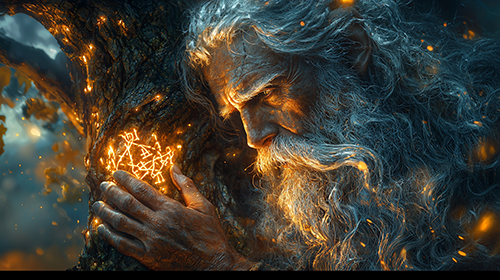 Runes
RunesOdin and the Dead
Odin is not merely a warrior or scholar. He is the ruler of slain warriors—master of Valhalla. Alongside the Valkyries, he selects those who died in battle and brings them to his hall.
In Valhalla, these souls—the einherjar—train daily preparing for the final battle of Ragnarök. Odin prepares his heavenly army. He also journeys through the realm of the dead, consulting seeresses to learn the fate of the gods.
This narrative emphasizes Odin’s life between worlds—between life and death, light and shadow.
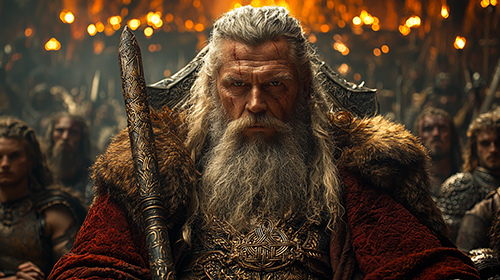 Odin and the Dead
Odin and the DeadOdin the Wanderer and Sorcerer
In many stories, Odin travels incognito in a cloak and hat under names like Grímnir, Gangleri, or others. He is identified by his grey cloak, the spear Gungnir, and his two ravens—Huginn (“Thought”) and Muninn (“Memory”)—who fly across the world daily and return with news.
He practices the shamanic magic seiðr, typically used by women—divination, deception, and mind-altering magic. Other gods disdained this, but Odin embraced it nevertheless. He stood apart from conventional norms—he was always different.
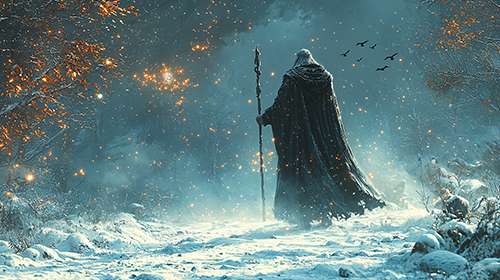 Odin the Wanderer and Sorcerer
Odin the Wanderer and SorcererOdin at Ragnarök
Odin’s final act unfolds during Ragnarök, the ultimate doom of the gods. Clad in armor and wielding his spear, he leads the einherjar and other gods in battle.
But prophecy from the Völuspá foretells that he will be devoured by the wolf Fenrir. However, his son Víðarr avenges him by slaying the beast. Odin knows his fate, yet he does not retreat—he meets death with honor. This final act elevates him from god to heroic legend: one who embraces fate rather than fighting it.
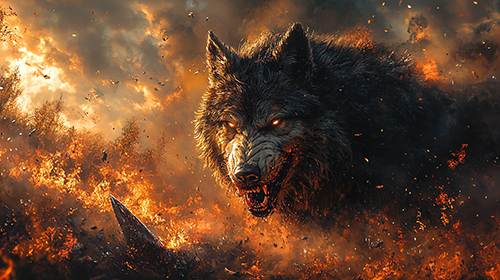 Odin at Ragnarök
Odin at RagnarökWho is Odin to the Norse?
Odin is the eternal seeker—symbol of wisdom, sacrifice, war, and death. His attributes include one eye, the spear Gungnir, his ravens, wolves, and the eight-legged horse Sleipnir. He is warrior, teacher, sorcerer, wanderer.
In modern culture, Odin may be depicted as a kindly old god or leader—but in the Eddas he is grim, profound, and utterly devoted to seeking truth. He is not good or evil—he is the unavoidable power of knowledge and destiny, just as the ancient Norse understood him.
